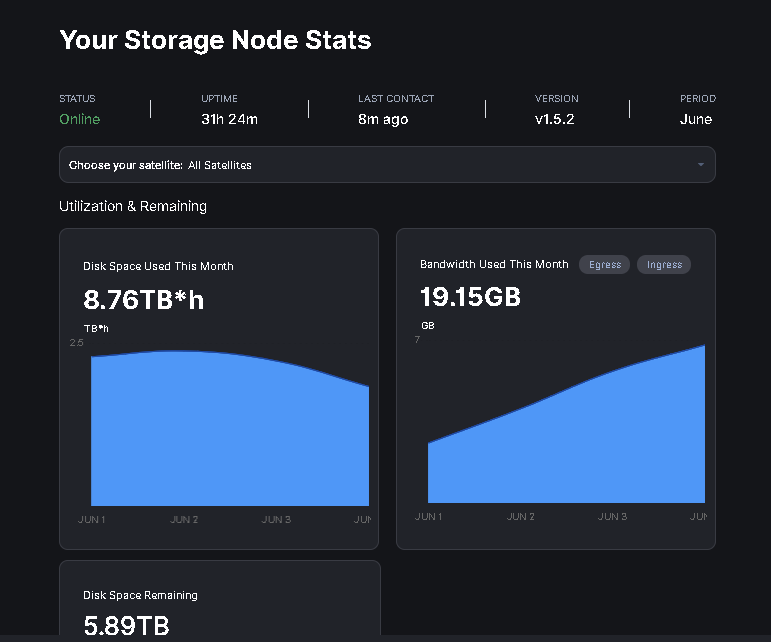A post was merged into an existing topic: HTTP source: Get https://tardigrade.io/trusted-satellites: dial tcp: lookup tardigrade.io
How do I reconcile the Disk Space Used This Month being in TBh when my bandwidth Used is in GB’s?
My drive is only 8TB or ~6TB assigned to the node…how could I i possibly have 8.76TBh Disk Space used?
With algebra:

I see.
Displaying it like 8.76TB*h seems misleading.
I don’t think it’s misleading (math is math), but displaying in GB*month or TB*month would probably be more useful.
8.76TB * hours doesnt seem misleading?
because in 4 days, lets just call it 96 hours…
thats 8.76TB * 96 hours that does not equate to how much space was used that month (up to that point in time)
at least, that’s how i read it… like i said misleading
No, it’s not misleading. TB*hours is the unit. It doesn’t mean you multiply 8.76 by the number of hours in the month so far, it means in the month so far, you have stored 8.76 TB*hours of data for the network.
1 TB*hour means you stored a cumulative 1TB of data for a cumulative 1 hour. That could be storing 1TB for 1 hour or 500GB for 2 hours.
These are common units when dealing with timed storage. S3 uses the GB*month unit, for example.
Right, its just misleading to someone not familiar with the fact that a TB*h = TBhours.
I guess I am just not familiar with timed storage.
What I actually take issues is the way Terrabyte hours is being displayed. TBhrs seems like a more useful way to display that unit. But, like I said, not my industry.
“Misleading” is a bit strong here. Calculus is strange to people who don’t know calculus. That doesn’t make calculus misleading, it means you need to learn calculus before you understand it.
How is that better? It’s exactly the same thing.
It would make more sense to add a little pop-up explaining what the unit means, or adding a unit selection drop down that could be used to select TB*hour or GB*hour or GB*month or whatever.
If you’re running a storage node, it is your industry now.
I agree with this whole heartedly.
I saw this in your deleted post and I’m not sure if you figured it out or not so I wanted to address it:
I would never write TB*h (personally) it would be TB/hr or TB/hrs.
Those are different units though. One is “terabyte hours” and the other is “terabytes per hour.” The former is a measure of timed storage and the latter is a measure of throughput/bandwidth. They are used for measuring different things and they’re not interchangeable.
Storing 1TB of data for 1 hour is 1TB*h.
Transferring 1TB of data in 1 hour is 1TB/h of throughput.
The difference becomes apparent when you try to convert. If you convert to minutes:
1 TB*hour = 60 TB*minute. Storing 1TB of data for 1 hour produces equivalent revenue as storing 60TB for 1 minute 1. It’s the same amount of “timed storage.”
1 TB/hour = 1/60 TB/min. Moving 1TB of data in 1 hour means the average sustained transfer rate was 1/60 TB each minute.
1 Assuming Storj uses a billing granularity of 1 minute or smaller. I admit I don’t know what granularity Storj uses. Regardless, this illustration is just that: an illustration.
Thank you. That is very helpful.
I completely confused these units.
I guess what I was really looking for was a throughput graph and I didn’t understand the storage hours graph at all.
i never took calculus ![]()
Aha – that’s the graph on the right. Egress is traffic out from your node (your node serving its contents – you get paid on this) and ingress is traffic into your node (this is new data to store – you do not get paid for ingress directly).
The summary (19.15GB) is since the start of the month. If you hover over the graph you’ll see the amount of data transferred that day. You can simply convert GB/day to whatever unit you want, but keep in mind this would be an average over the whole day where actual traffic tends to be a bit “spikier.”
Who of you knows what kWh are and how to calculate them?
Just curious, because it’s the same thing with TBh and I always thought everyone knows what kWh are and how you calculate it so they should be able to understand TBh but I may have been wrong.
If you surveyed random people on the street, I’d be surprised if everybody could define a Kwh or even tell you if it was a unit of energy or power.
… you’d find that an awful lot of people are not interested in an awful lot of interesting stuff.
Alas! 'Tis the way it is…
Very true. Maybe I’m just surprised that people don’t know a basic unit they should know because of its impact on their monthly power bill…
And probably because I expected most people on this forum calculating their costs of running a NAS/PC and therefore using kWh.
well they could be russians… then they would have no need to calculate the power bill because it’s basically free… lol
This is way funnier than you know…
I have some experience…
Worked for a company developing metallurgical temperature measurement… Chief Scientist: Russian.
Learned how to Fence… Principal teacher: Russian.
Superconductor circuits… Chief Engineer: Russian.
hmmmm…
Interesting.
